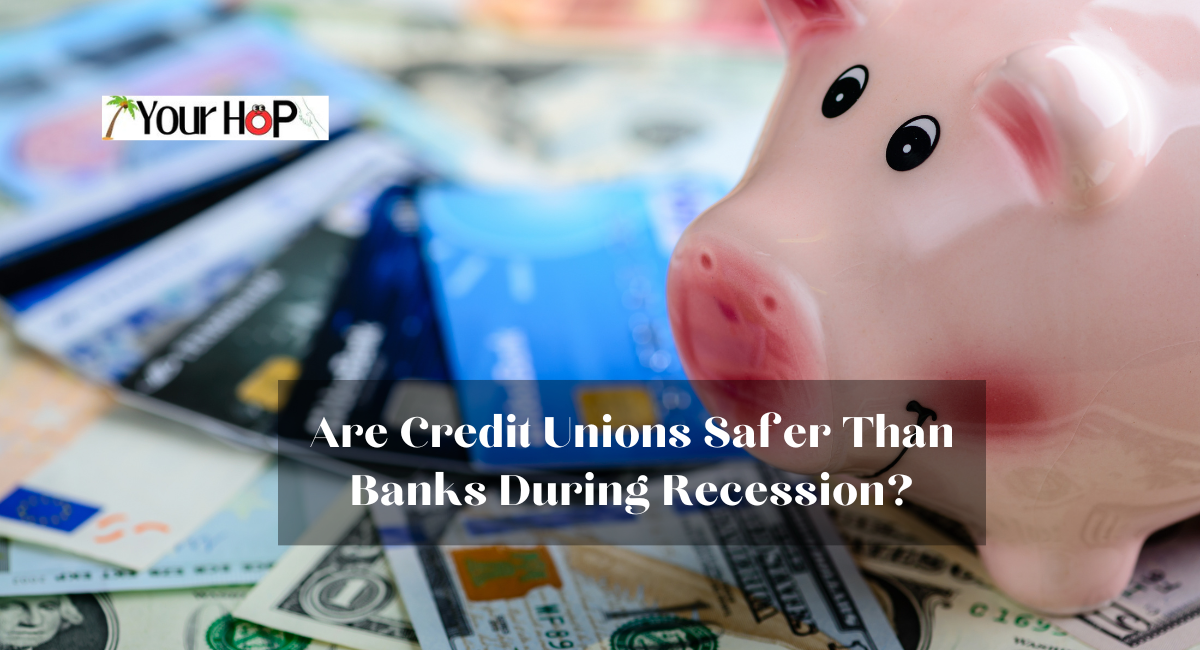Many people wonder if credit unions are safer than banks during uncertain economic times. This is an important question for those looking for secure and trustworthy financial institutions.
In this article, we will explore the difference between credit unions and banks. And see if credit unions are a safer option than banks in a recession. We will also tell you the pros and cons of credit unions and banks.
What Is A Credit Union?
A credit union is a type of bank that works together with its members to offer different money services. Unlike regular banks, credit unions don’t make a profit and are owned and controlled by their members.
The main goal of a credit union is to help its members have something in common, like working for the same company, living in the same area, or being in the same group.
Some important features of credit unions are:
1. Membership: Credit union members usually have something in common, like working at the same place, living in the same area, or being part of the same group.
2. Ownership: Each member has the same ownership and voting rights, no matter how much money they have put in.
3. Not-for-Profit Structure: Credit unions work without aiming to make a profit, so any extra money they make is usually given back to their members through lower fees, higher interest rates for savings, and lower interest rates for loans.
4. Member Services: Credit unions provide different types of money services, like savings and checking accounts, loans, credit cards, and other money products. These services are designed to meet the needs of their specific members.
5. Community Focus: A lot of credit unions care a lot about their community and like to focus on local connections and helping the community grow.
Credit unions are overseen and protected, like banks, which makes them safe for their members. The way credit unions are organized, with everyone working together and focusing on members’ needs, makes them unique and creates a feeling of community and shared financial responsibility.
Are Credit Unions Safer Than Banks During Recession?
Yes. In general, credit unions are safer than banks during the recession. This is because credit unions take fewer chances and cater to individuals and small businesses rather than big investors than a bank.
Credit unions are owned by their members and don’t make a profit. They serve a smaller group of people in a community.
Banks, on the other hand, serve a larger number of people and have branches all over the country or even the world. That’s why investors and big companies prefer banks instead of credit unions.
How Are Credit Unions And Banks Different?
Credit unions and banks are both places where you can manage your money, but they have some differences in how they are set up, who owns them, and how they do things. Here are some important ways that credit unions and banks are different:
Ownership And Structure
Credit Unions: Credit unions are businesses that work together with their customers. The customers own and control the credit unions.
These customers usually have something in common, like working for the same company, living in the same area, or being part of the same group.
All customers have the same rights and say in how the credit union is run, no matter how much money they have put in.
Banks: Banks are businesses owned by shareholders. Shareholders choose a group of people called the board of directors, and the money made by the bank is shared among the shareholders.
Profit Motive
Credit Unions: Credit unions are organizations that are not focused on making a profit. Any extra money they have is usually given back to their members in the form of reduced fees, increased interest rates on savings, and decreased interest rates on loans.
Banks: Banks want to make money for their owners. This means they may charge more fees and higher interest rates than credit unions.
Membership Criteria
Credit Unions: Membership requirements often include a shared connection among members, like working for the same company, living in the same area, or being part of a particular organization.
Banks: Banks are open to everyone and can serve many different types of customers.
Local Vs. Global Focus
Credit unions: A lot of credit unions have a focus on a specific local area or community. They may prioritize meeting the financial needs of a particular community or group of people.
Banks: Banks can be small, medium, big, or global in size. They usually offer more services and have branches in more places.
Regulation And Insurance
Credit Unions: Credit unions are like banks. They are regulated and insured, which means they provide financial security for their members. In the United States, credit unions are insured by the National Credit Union Administration (NCUA).
Banks: Banks are supervised and protected by organizations like the Federal Deposit Insurance Corporation (FDIC) in the United States.
Pros And Cons For Credit Unions And Banks
Credit Unions
Pros
1. Members also own the business, which creates a feeling of togetherness and shared obligation.
2. Non-profit organizations often give back extra money to their members by offering them improved interest rates and reduced fees.
3. Credit unions frequently provide tailored assistance, comprehending the distinct requirements of their members.
4. Credit unions might have lower interest rates on loans than traditional banks.
5. Credit unions often prioritize their local communities by backing local projects and promoting local growth.
Cons
1. Credit unions may have less branches and ATMs compared to big banks, which makes it harder to access their services.
2. Some credit unions may be slower in adopting the newest banking technologies and online services.
3. Some credit unions have requirements for joining that may prevent certain individuals from joining.
4. Credit unions may offer fewer financial products and services compared to large banks.
5. Credit union members might have difficulties using ATMs that are not part of their network and might have to pay fees.
Banks
Pros
1. Banks usually have branches and ATMs in many different places, which makes it easier for people to access their services.
2. Banks usually put money into better banking technology, like online banking, mobile apps, and other digital services.
3. Banks usually provide a variety of financial products and services, such as investment choices and specialized accounts.
4. Banks are easy to use because they are open for long hours, have many locations, and offer a variety of services for different financial needs.
5. Anyone can join a bank without meeting any special requirements.
Cons
1. Banks aim to make money, so they may charge customers more fees and offer lower interest rates.
2. Bigger banks might offer less individualized assistance compared to credit unions.
3. Shareholders may have more say in decisions than customers.
4. Banks may have stricter rules for giving out loans, which can make it hard for some people to get them.
5. Banks might ask for more money for things like overdrafts and keeping your account.
During the recession, it is very important to keep your money safe. Credit unions and banks are two options for keeping your money safe. Our research shows that credit unions can be a good choice during a recession. They have unique advantages that make them a good option for protecting your money during tough economic times.
Thanks for reading. I hope you find it interesting.


